Stair-case is the best saviour when it comes to missing workouts due to time constraints/busy schedule/no access to gym and all possible reasons for not working out (of course, pains and injuries are an exception).
Climbing up the stairs has many incredible advantages. It not only helps burn fat, but also strengthens the core and the lower body muscles along with improving stamina and endurance. Check out the detailed benefits in Master Coach Luke Coutinho’s blog- https://goqii.com/blog/stair-climbing-one-of-the-best-exercises/.
To make the stair workout adventurous and to prevent any possible chances of monotony, we can bring about certain variations and create a whole set of workouts on a staircase. All you need is just enough stairs on which you can run continuously for 10 to 15 seconds.
Check out these 10 staircase workouts to multiply the benefits of a regular stair-climbing workout:
1) Stair jog:
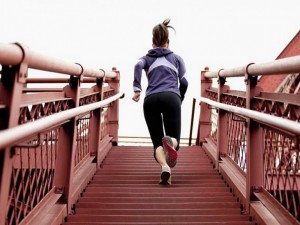
* Jog up the stairs but on descending walk to avoid falls
* To make it advanced, you can take 2 steps at a time
* Continue for minimum 5 minutes
2) Stair sprint:
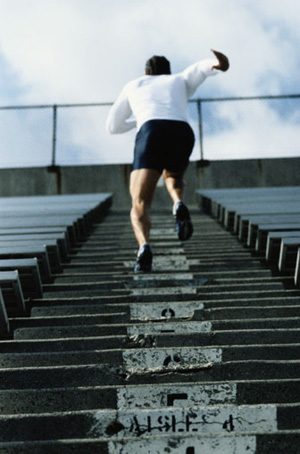
* Sprint as fast as you can
* Make sure you take just one step at a time
* Breathe deeper while you sprint
3) Step ups:
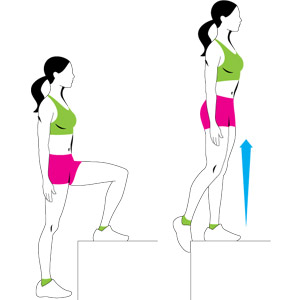
* Step ups are simple, like you usually do on the stepper. But, doing it on a stair-case requires an extra effort.
* Make sure your knee doesn’t cross the toe. Apply maximum pressure on your heels to avoid any pressure on the knee.
* If you have no prominent knee pain, you can speed up a bit.
* Alternate the feet while you complete minimum 30 step ups.
4) Side step ups:
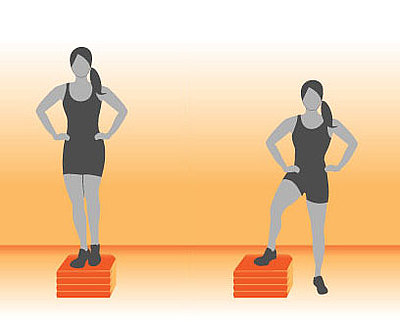
* This includes stepping up and stepping down sideways
* Complete minimum 30 step ups- 15 with right foot and the rest 15 with left foot
5) Stair lunges:
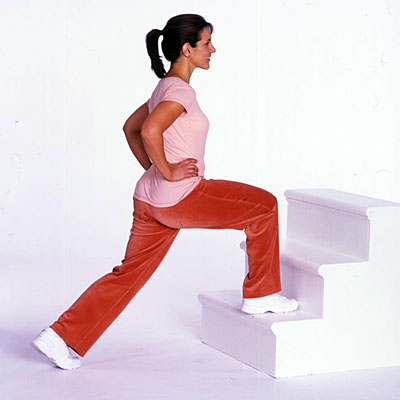
* Lunges are a great way to strengthen your quadriceps, gluteus, lower back and core
* You can either take one step or 2 steps for each lunge
* Do the stable lunges first and then try out the jump lunges alternating the left and the right foot. This is fun, I tell you!
6) Tricep dips:
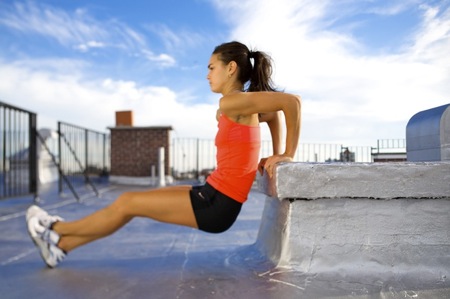
* These help to strengthen the triceps and anterior deltoid (front part of the shoulder)
* All you have to do is, sit on the edge of the first or second step with your arms shoulder width apart. Keep your legs straight on the floor.Take your bottom up by pressing your palms against the step and then lower down your rear until your arms are at about a 90 degree angle. Continue with the up-down movement.
7) Double leg stair hops:

* Jump up on stairs with both the feet together.
* You can either keep your feet shoulder-width apart or keep both the feet together and hop. Maintain soft knees (slightly bent knees) and swing your arms backwards. Hop up the stairs and then come down walking.
8) Single leg hops:
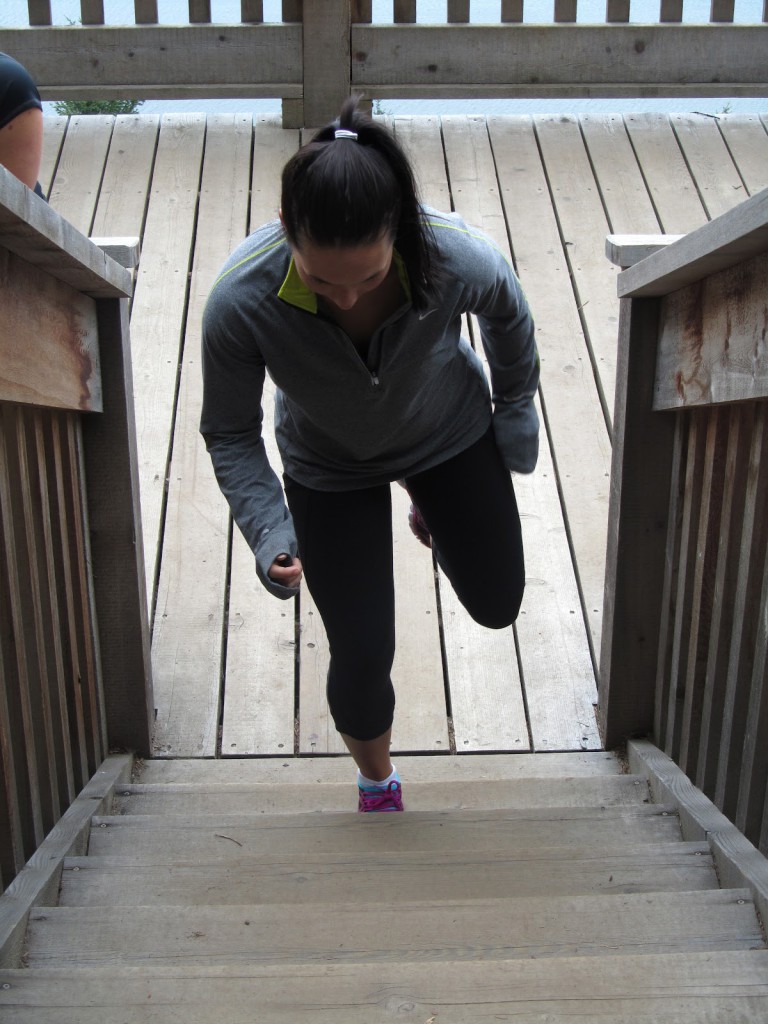
* To add a twist to the hops, we can do it on one leg and make it more challenging
* This is going to engage your core big time as it works harder to stabilize the body
* Go one whole flight on your left foot, and then switch onto your right foot and perform the full flight
9) Incline push-ups:
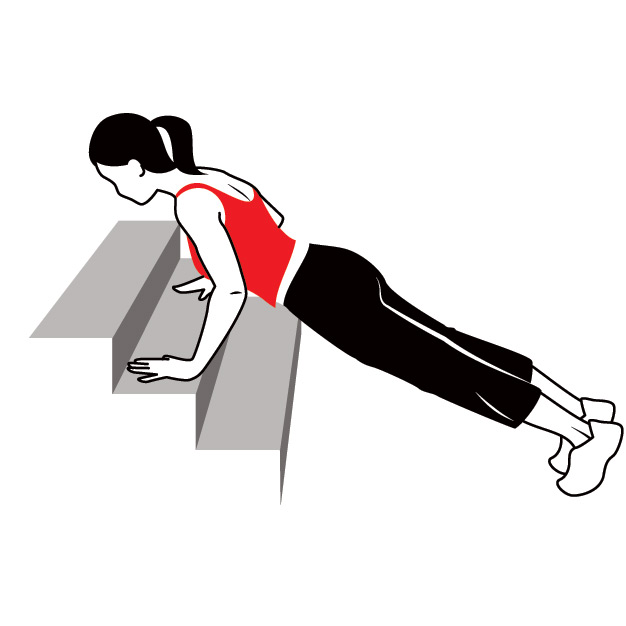
* Incline push-ups help strengthen your chest, anterior deltoid and triceps too.
* Keep both the hands shoulder width apart on the step and extend your legs out. Maintain a straight back and feet close together and push push push!!
10) Skater steps:
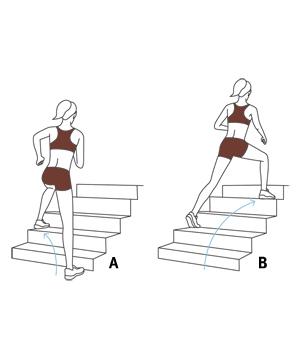
* Keep your left foot on the left corner of the second step.Climb up with your right leg, bringing it to the right corner of the 4th step. You skate through the stairs this way taking two steps at a time. Swing your arms and skate your way through this leg burner.
These 10 workouts form a whole set of workouts that train your upper and lower body both. Guess what? You have just turned a stair-case into a gym. You can perform a high intensity interval workout (HIIT) too using these stair exercises.
Pick any 4 or 5 exercises, perform each exercise for 20 seconds with a 10 seconds break in between and repeat the entire cycle once again. Believe me, you end up burning more calories in these few minutes than what you would have burnt in 1 hour of gyming.
Safety first! If you suffer from any knee/ankle pain, please avoid the exercises that involve these specific joints.




Leave a Reply